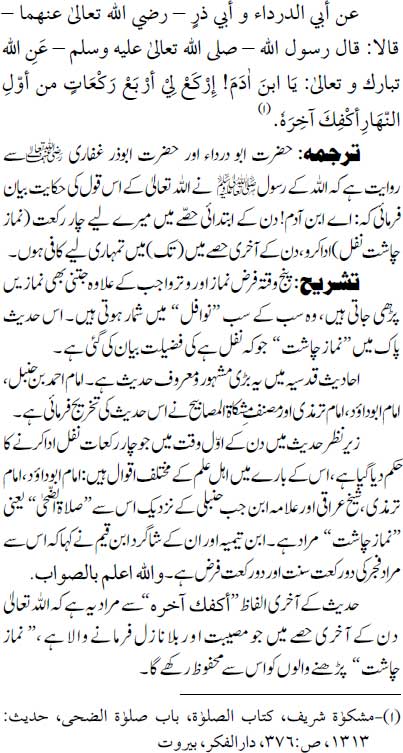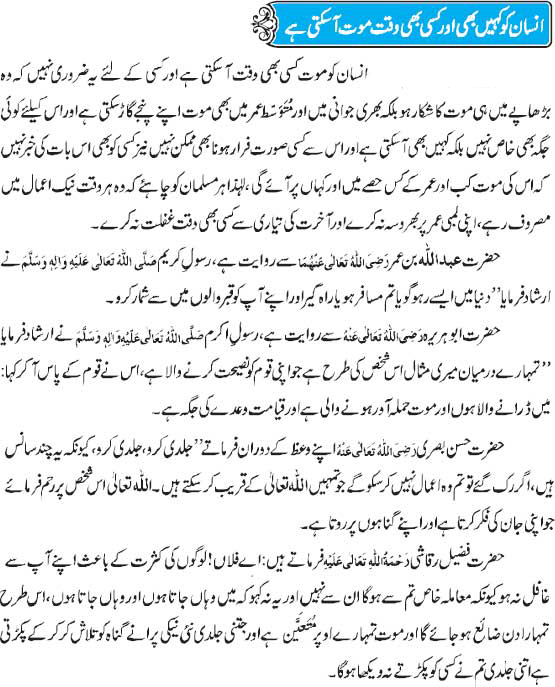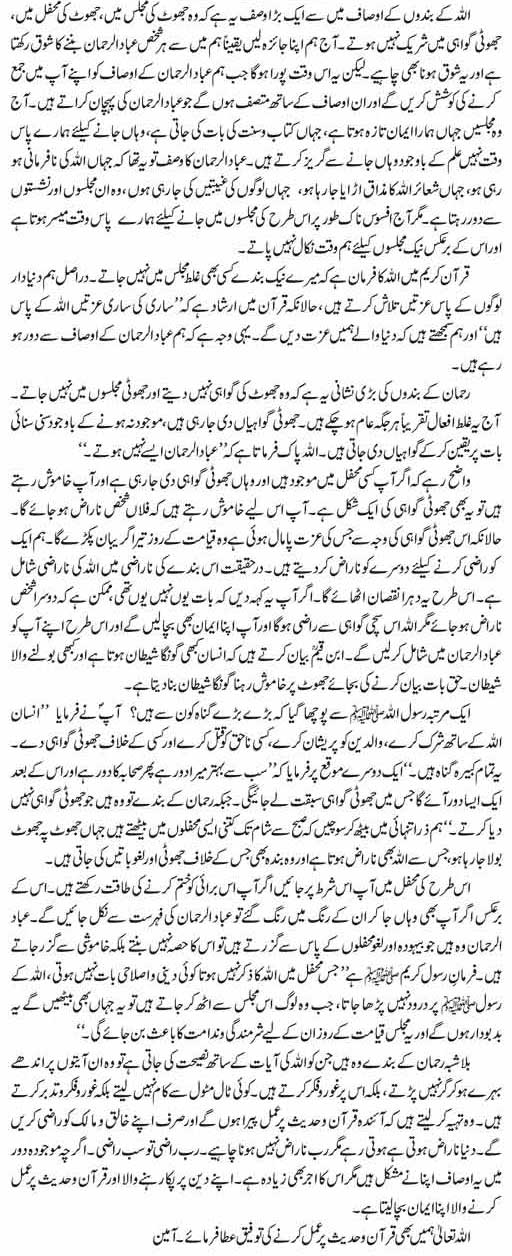
Khasais-e-Mustafa by Mufti Muneeb-ur-Rehman
Remember Allah And Allah Will Remember You
[Allah’s Quran – 2:152] “You remember Me, and I shall remember you! Offer your thanks to Me, and do not (ever) be ungrateful!”
The Prophet (peace be upon him) has said: [Bukhari, Book#11, Hadith #629] “Narrated Abu Huraira: The Prophet said, “Allah will give shade, to seven, on the Day when there will be no shade but His. (These seven persons are) a just ruler, a youth who has been brought up in the worship of Allah (i.e. worships Allah sincerely from childhood), a man whose heart is attached to the mosques (i.e. to pray the compulsory prayers in the mosque in congregation), two persons who love each other only for Allah’s sake and they meet and part in Allah’s cause only, a man who refuses the call of a charming woman of noble birth for illicit intercourse with her and says: I am afraid of Allah, a man who gives charitable gifts so secretly that his left-hand does not know what his right hand has given (i.e. nobody knows how much he has given in charity), and a person who remembers Allah in seclusion and his eyes are then flooded with tears.”
[Muslim, Book #005, Hadith #2248] “Abu Huraira reported that the Apostle of Allah (may peace be upon him) had said: Seven are (the persons) whom Allah would give protection with His shade on the Day when there would be no shade but that of Him (i. e. on the Day of Judgment, and they are): a just ruler, a youth who grew up with the worship of Allah; a person whose heart is attached to the mosques; two persons who love and meet each other and depart from each other for the sake of Allah; a man whom a beautiful woman of high rank seduces (for illicit relation), but he (rejects this offer by saying):” I fear Allah”; a person who gives charity and conceals it (to such an extent) that the right-hand does not know what the left has given: and a person who remembered Allah in privacy and his eyes shed tears.”
Hadith Qudsi: Chasht Namaz

Hadith Qudsi: Chasht Namaz
Our Lord! Please Guide Us Onto The Straight PATH
Our LORD! Please Guide us onto The Straight PATH [1:6]
God is reminding us that it is not our deeds alone that bring guidance or forgiveness, but it is something that He bestows upon us as a favor.
{Guide us to the Straight Path. The way of those whom You have bestowed Your Grace. Not of those who earn Your anger, nor of those who go astray.} (Al-Fatihah 1: 6-7)
When we examine these verses, we find that it has some very interesting qualities that make them a unique prayer.
In a short examination of the above verses, especially the section we have highlighted, we will find guidance on:
Having humility as a servant of God in the community
Ascribing success to God and not to oneself
The comprehensiveness of Islam
The social nature of the Islamic message
As we explore chapter Al-Fatihah, we will pick these four lessons.
1. Humility
In this prayer that God revealed to us, it is clear that we are to ask for guidance upon the “Straight Way”. However, the nature of this path, its location, its signs, its characteristics, and its directions are all left out. We are given no indication as to how to get there, or how to find the map for it. Instead, the path is described in one single way: {The Path of Those Whom You Have Favored}.
It is interesting that rather than pointing to concepts or ideas for the individual to discover on one’s own, God pointed to people. He tells us that this path is found with those whom His favor is upon. What is the point of doing this?
It has immediately turned us into students. We are seeking this path and when God points to the people whom He has favored; our minds become fixed on seeking out these people. Who are they? How can we be like them? How can we join their company? Rather than allowing us to feel arrogant that we are on the “Straight Path”, we have been directed toward others who may already be there. But again…who are they?
{All who obey Allah and the Messenger are in the company of those on whom is the Grace of Allah, – of the prophets (who teach), the sincere (lovers of Truth), the witnesses (who testify), and the Righteous (who do good): Ah! what a beautiful fellowship!} (An-Nisa’ 4: 69)
And here we have: How to join this company: To “Obey God and the Messenger”.
The company consists of the Prophets, the Siddiqeen (the truthful sincere servants of God), the Shuhadaa (those who testify to the Truth with their speech, and if needed will defend the Truth and the innocent with their lives), and the Saliheen (those who are righteous in actions).
God then praises this group by calling it a beautiful fellowship.
By naming these four groups of people in the Quran as those whom the Grace of God is upon, He has pointed us not to a set of concepts, but to a community and a set of examples. From the teachings of the Prophets, we take knowledge and the framework of truth for all that follows. From the Siddiqin (the truthful) we derive the lessons and examples of sincere worship. From the Shuhada we see examples of those who act and struggle to testify to Truth. And from the Saliheen we see examples of righteous actions. So the one aiming for the Straight Path should seek out these people, their company, and their examples, and learn from what they have.
Though we can attract His mercy through sincerity, God is reminding us that it is not our deeds alone that bring guidance or forgiveness, …
This teaches the servant that he should think himself self-reliant in his journey towards God’s grace but should remember that there are those in the past and those in the community that he can seek out and be in good company with.
2. Ascribing Success to God
In mentioning the Straight Path, God does not simply provide a list of actions. Instead, He makes it clear that He is the one acting.
The Arabic word “An’amta” means “You bestow (favor) upon” in reference to God. A subtle reminder that we are not the ones who “earn” God’s grace, but that He gives it to us out of His mercy. Though we can attract His mercy through sincerity, God is reminding us that it is not our deeds alone that bring guidance or forgiveness, but it is something that He bestows upon us as a favor. This again reminds the servant to be humble before God.
3. The Comprehensiveness of Islam
Every group, methodology, and ideology will have some method or idea that it sees as the primary driver of Islamic reform for the individual and the community. Some groups oriented around Tasawwuf (self-improvement) will focus on spiritual purification. Others focused on societal change, on activism in the community – both social and political. Other organizations will focus on righteous deeds and worship. Yet others will focus on knowledge.
However, we see that when God describes the people who have His grace, they represent all of these various interests.
The Prophets: The bearers of the Message of God, the deliverers of knowledge from God to humanity, and the providers of the religious foundation for generations to come and all the groups that follow below..
The Sincere and Truthful: Those whose hearts are purified and sincere in their reverence for God and in their actions amongst people. Truthfulness emanates not only in their speech but in their actions, because their intentions are pure and for God alone..
The Witnesses: Those who actively strive to witness the truth under extraordinary circumstances, whether under threat of loss of life or wealth. They testify to Islam and call for goodness and benefit and may eventually find themselves giving all they have in order to defend innocent people and protect the lives of others.
The Righteous: Those who dedicate extraordinary amounts of time to doing good deeds. Prayer, fasting, giving charity, visiting the sick, helping the orphans, remembering the name of God, reciting the Quran, and doing their utmost to have their limbs always in the worship of the Creator and in the service of His Creation.
…. the Quran has pointed us toward a religion that is not individualistic but is based on being part of a community
It is amazing that in describing the people of the “Straight Path”, the Quran mentions all of the various goals and methods – the seeking of knowledge, the purification of the soul, activism, and the doing of good deeds. Yet another testament to the fact that Islam is comprehensive, and calls for balance in the various priorities on the Straight Path.
4. The Social Nature of the Islamic Message
By highlighting a set of people, instead of a list of to-dos, the Quran has pointed us toward a religion that is not individualistic but is based on being part of a community. It is asking us to seek out people from whom we can learn, and good company with whom we can be.
As the Prophet Muhammad said: “A person is upon the religion of his/her friends.” (Abu Dawud) The most intimate companions of a person will often affect his/her faith and influence the direction of his/her life. But if we know that we should seek the knowledge and stay within the framework provided by the Prophet, strive to be with people who show purity and sincerity as best as we can notice, spend time in circles of activism and call to good things, and work hard to do righteous actions and be in groups that do righteous actions, the Quran is telling us that in presence with that company, we are on the “Straight Path”.
By Abdul Sattar Ahmed
Insan Ko Kahin Bhi Kisi Bhi Waqt Moat Aa Sakti Hai

Insan Ko Kahin Bhi Kisi Bhi Waqt Moat Aa Sakti Hai
Jhooti Gawahi

Jhooti Gawahi
And Celebrate The Praises Of Your Lord
And from among you there should be a party who invite to good and enjoin what is right and forbid the wrong, and these it is that shall be successful.
[Sahih Al-Bukhari: Volume 1, Book 10, Number 547] Narrated Jarir bin ‘Abdullah: We were with the Prophet on a full moon night. He looked at the moon and said, “You will certainly see your Lord as you see this moon, and there will be no trouble in seeing Him. So if you can avoid missing (through sleep, business, etc.) a prayer before the rising of the sun (Fajr) and before its setting (‘Asr) you must do so. He (the Prophet ) then recited the following verse: “And celebrate the praises Of Your Lord before The rising of the sun And before (its) setting.” (50.39)
[20. Surah Tauha: Ayah 130]” And glorify your Lord by the praising of Him before the rising of the sun and before its setting, and during hours of the night do also glorify (Him) and during parts of the day, that you may be well pleased.”
[20. Surah Tauha: Ayah 131] Do not let your eyes crave what We have allowed some of the disbelievers to enjoy; the ˹fleeting˺ splendor of this worldly life, which We test them with. But your Lord’s provision ˹in the Hereafter˺ is far better and more lasting.
[20. Surah Tauha: Ayah 132] Bid your people to pray, and be diligent in ˹observing˺ it. We do not ask you to provide. It is We Who provide for you. And the ultimate outcome is ˹only˺ for ˹the people of˺ righteousness.
My Lord! grant me that I should be grateful for Thy favor which Thou hast bestowed on me and on my parents and that I should do good such as Thou art pleased with, and make me enter, by Thy mercy, into Thy servants, the good ones.
Hadith Qudsi: Sila Rehmi


Hadith Qudsi: Sila Rehmi
Ahad Ahad: Bilal Radhiyallaho `Anhu
Bilal (Radhiyallaho Anhu) is one of the Best known of the galaxy of ‘Sahabah’ as ‘Moazzin’ of the Prophet (Sallallaho `alaihe wasallam) ‘Masjid’. He was an Abyssinian slave of a disbeliever in Mecca. His conversion to Islam was, naturally, not liked by his master and he was, therefore, persecuted mercilessly.
Ummayah bin Khalaf, who was the worst enemy of Islam, would make him lie down on the burning sand at midday and would place a heavy stone on his breast so that he could not even move a limb…! he would then say to him…
‘Renounce Islam or swelter and die.’
Even under these afflictions, Bilal (Radhiyallaho Anhu) would exclaim…
‘Ahad’ The One Allah! ‘Ahad’ The One Allah!
He was whipped at night and with the cuts thus received, made to lie on the burning ground during the day to make him either forsake Islam or die a lingering death from wounds. The torturers would get tired and take turns… Abu Jahl, Umayyah, and others would vie with one another in afflicting more and more painful punishments …but Bilal (Radhiyallaho Anhu) would not yield. Subhan Allah!
At last Abu Bakr (Radhiyallaho Anhu) bought Bilal’s (R.A.) freedom, and he became a free Muslim…! As Islam taught implicitly the oneness of the Almighty Creator, while the idolaters of Mecca believed in many gods and goddesses with minor godlings, therefore Bilal (Radhiyallaho Anhu) repeated…
‘Ahad (The One), Ahad (The One).’
This shows his love and devotion to Allah. Allah was so dear to him that no amount of persecution could distract him from reciting His Holy name. It is said that the urchins of Mecca would drag him in the streets, with his words ‘Ahad’ ‘Ahad ‘ ringing in their wake.
Look how Allah rewarded his steadfastness…! He was to have the honor of becoming the Prophet (Peace be upon him) Moazzin. He was always to remain with him at home and abroad to call out the Azaan for his ‘Salaat’.
After the Prophet’s (peace be upon him) death it became very hard for him to continue his stay in Madinah where he would miss him at every step and in every corner…He, therefore, left Madinah and decided to pass the rest of his life striving in the path of Allah. Once he beheld the Prophet (Sallallaho `Alaihe Wasallam) in his dream saying to him…
‘O, Bilal! How is it that you never visit me?’
No sooner did he get up than he set out for ‘Madinah’. upon reaching there, Hasan and Husain (Radhiyallaho anhuma) The Prophet’s (Sallallaho `Alaihe Wasallam) grandsons requested him to call out the ‘Azaan’.
he could not refuse them, for they were very dear to him. But as soon as the ‘Azaan’ was called, the people of Madinah cried openly out of their anguish at the memory of the happy old days of the Prophet (Sallallaho `alaihe wasallam) time. Even the women came out of their houses weeping. Bilal (Radhiyallaho Anhu) left Madinah again after a few days and died in Damascus in 20 A..H.
Notes:
The great devotee and Muazzin of PROPHET( SALLALLAHO `Alaihe Wa Sallam) the courageous and beloved Abyssinian by the name of Bilal Habshi (Radhiyallaho Anhu) passed away in the middle of reading ‘Azaan’ in Damascus, Syria between the years 638 and 642 (AD). This was the second time after the death of PROPHET( SALLALLAHO `ALAIHE WASALLAM) that BILAL( Radhiyallaho Anhu) recited the Azaan.
Durood-o-Salam Kay Fazail-o-Barkat

Durood-o-Salam Kay Fazail-o-Barkat

